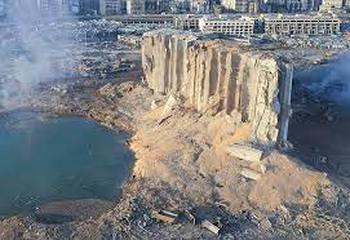Written in white heat.
[Townhall] Since Israel’s ill-considered retreat from Gazoo...Hellhole adjunct to Israel and Egypt's Sinai Peninsula, inhabited by Gazooks. The place was acquired in the wake of the 1967 War and then presented to Paleostinian control in 2006 by Ariel Sharon, who had entered his dotage. It is currently ruled with a rusty iron fist by Hamas with about the living conditions you'd expect. It periodically attacks the Hated Zionist Entity whenever Iran needs a ruckus created or the hard boyz get bored, getting thumped by the IDF in return. The ruling turbans then wave the bloody shirt and holler loudly about
oppressionand
disproportionate response...
, the enclave has represented a source of billions of dollars for the right concessions in the Jewish state.
When Hamas
 ..a regional Iranian catspaw,...
..a regional Iranian catspaw,...won the last legislative elections in 2006 and took control of Gaza, one of the first things it did was to close the border crossings with Israel. Hamas to this day refuses to have any direct contact with Jews or Israel and does all of its negotiating with intermediaries like Egypt and Qatar
...an emirate on the east coast of the Arabian Peninsula. It sits on some really productive gas and oil deposits, which produces the highest per capita income in the world. They piss it all away on religion, financing the Moslem Brotherhood and several al-Qaeda affiliates. Home of nutbag holy manYusuf al-Qaradawi...
. On the day of the surprise crossing closing, I heard the hourly news broadcast. There was an interview with a very frantic head of some kibbutz organization. "I have dozens of trucks with fresh produce that will rot sitting on the Israeli side of the crossings. This is a disaster!" I thought that his concern seemed a little out of place. It reminded me of a cartoon in the Chicago Tribune during a period in the 1980s when there were several near-misses between airplanes. While all of the passengers on one plane in the comic look terrified at seeing the second plane so close, one guy asks, "Why did they get meat and we only have chicken?" It would appear that most people would be worried about a terrorist group taking over Gaza more than the fate of some turnips.
After Hamas took control of Gaza and removed the Paleostinian Authority (PA), certain Israeli companies started to make a lot of money. Whereas the PA was allowed to go a billion shekels in the hole (just now repaid through the actions of the aggressive Israeli finance minister, Bezalel Smotrich) for electricity, everything in Hamas’ Gaza had to be paid up front—oftentimes by the Europeans or NGOs. There was no good will or IOUs in Gaza. Rather it was cash on the barrelhead. I remember during one period, the local company that provided heating oil simply stopped providing the same: no payments, no deliveries. I wanted to write a book on the spectacular financial windfall for the providers of food, electricity, heating oil, gasoline, and other goods to the Jew-hating residents of Gaza. Israel would even periodically send a Brinks truck to exchange worn out Israeli currency for fresh bills. Did anyone explain to Knesset members that Hamas was Israel’s enemy? My lawyers sued to have the practice of exchanging bills stopped; the high court threw out the complaint with no hearing.
I was reminded of Gaza the Cash Cow when one of our boys asked me a question: "Why did Israel agree to release prisoners for the dead bodies of hostages?" And his question was a good one. Israel and Hamas came up with some complex formula for prisoner release based on a hostage being a man or woman, soldier or civilian, live or dead. Live male soldiers generate the most prisoners released, and so on. But his question is fair: why agree to release anybody for a dead hostage? I know that the families want closure. They want to bury their kin and begin the process of mourning and healing. I don’t want to deny them this need. But every terrorist released is potentially a ticking time bomb for the future. Why would Israel release possible killers for bodies? The families of spy Eli Cohen and airman Ron Arad have suffered decades without having received the bodies of their loved ones who were murdered in enemy territory.
After the lopsided 1,000-1 Schalit deal, there was an interesting law proposal: simply limit the number of gunnies that can be released for any one hostage. The law would have been brilliant, because it would not only have limited Israel’s options, it would have entered the minds of Hamas that there is a limit. Just as a terrorist stops at a red light, he too can be told, "We’d love to give you 500 murderers, but what can we do? The law limits us to 5, so you had better pick carefully." Even Hamas would have accepted the law and many fewer gunnies like Yahya Sinwar would be released every time there is a hostage situation. The law was dropped by the Netanyahu government of that day and never pursued again. Why? My guess is money.
During the current war, Israel took possession of thousands of Paleostinian gunnies and civilians. Many were "Nukhba" fighters who had participated in the pogrom of October 7th. Others were military-aged men scooped up by IDF forces as they made their way north to south in Gaza. There were reports in the media that there was not enough room at the inn—Israeli prisons—for the massive influx of new bad guys. As in every Western country, housing criminals—or terrorists—is expensive. Guards, food, medical, facilities—it runs in the tens or hundreds of millions of shekels per year. What’s a great way to empty out Israel’s high-security prisons? Agree with Hamas to let out thousands of prisoners for hostages, dead or alive. Israel sees the deal as an opportunity to get rid of thousands of expensive prisoners and save a lot of money. Sure, there are risks, but hey we’ll catch them before they blow up the buses...oops, three of them blew up last week, but thank God there was nobody aboard.
While the needs of families of hostages who were murdered on October 7th or during Gaza captivity are understood, the requirement to release the fewest number of prisoners should be the concern of the prime minister and his government. There are 10 million Israelis, and many of them ride buses and trains and frequent cafes and restaurants. If the government was serious about protecting these citizens, it would have told Hamas that it won’t release a single prisoner for a dead hostage. Hadar Goldin’s family has waited over a decade without receiving their son’s remains. But one thing Israelis never miss is a bargain, and rather than tell Hamas to keep the bodies, which would have zero value for them, it agreed to release potentially dangerous prisoners for the dear departed captives. The hostage issue, pushed by the media and NGOs, has taken over Israeli discussions. If you so much as want the government to think twice about the terms of the hostage release, then you hate the hostages, you want them to die in Gaza and you are a terrible person. If Binyamin (Bibi) Netanyahu got out every living hostage but left the dead ones in Gaza, the country would come to a standstill until he agreed to whatever Hamas demanded to get the bodies home.

 ......
...... ...Turkey's version of Mohammed Morsi but they voted him back in so they deserve him. It's a sin, a shame, and a felony to insult the president of Turkey. In Anatolia did Recep Bey a stately Presidential Palace decree, that has 1100 rooms. That's 968 more than there are in the White House, 400 more than in Versailles, and 325 more than Buckingham Palace, so you know who's really most important...
...Turkey's version of Mohammed Morsi but they voted him back in so they deserve him. It's a sin, a shame, and a felony to insult the president of Turkey. In Anatolia did Recep Bey a stately Presidential Palace decree, that has 1100 rooms. That's 968 more than there are in the White House, 400 more than in Versailles, and 325 more than Buckingham Palace, so you know who's really most important... ...The Lebs have the curious habit of periodically murdering their heads of state or prime ministers, a practice dating back to the heady days of human sacrifice to Baal Moloch...
...The Lebs have the curious habit of periodically murdering their heads of state or prime ministers, a practice dating back to the heady days of human sacrifice to Baal Moloch... Wielding art instead of arms, Hamas issued an animated video on Sunday aimed at pressuring Israel into trading hundreds of jailed Palestinians for Gilad Shalit, a soldier held captive in Gaza for almost four years.
Wielding art instead of arms, Hamas issued an animated video on Sunday aimed at pressuring Israel into trading hundreds of jailed Palestinians for Gilad Shalit, a soldier held captive in Gaza for almost four years.